Ask anyone what will happen when the UK leaves the EU and they will shrug their shoulders. Seven weeks out from 29 March and we are still in the dark.
Some farmers along the border fear they could also be faced with challenges they never expected to see again. Closed roads, long delays at border crossings and constant checks as they go about their everyday lives.
The Irish Farmers Journal spent a day travelling in a LacPatrick milk lorry to meet farmers in their own yards. Driver Brian Patterson took us from LacPatrick’s head office in Monaghan town, through Keady and on to Bessbrook in Co Armagh. Fellow driver Reggie Hall covered the horseshoe of Monaghan that is surrounded by Co Fermanagh, taking in Ballinode and Scotstown, northwest of Monaghan town.
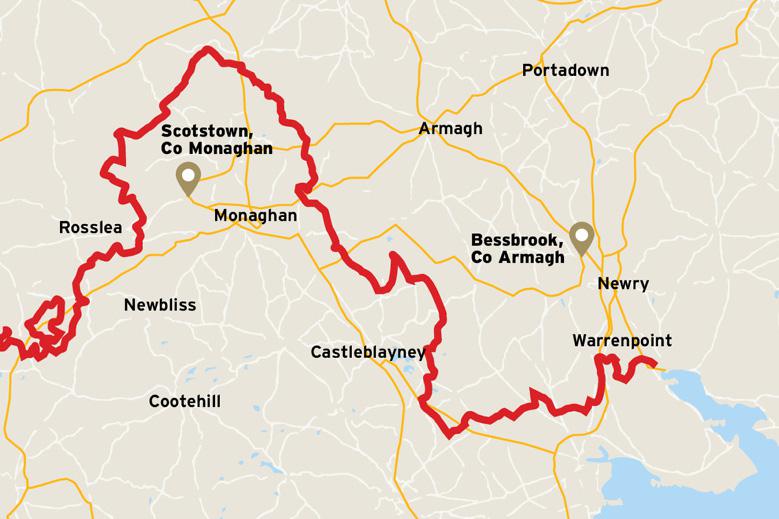
There is a maze of roads that may need to be patrolled in the event of a hard border. Our drivers pointed out just some of the roads that were closed in the past.
Farmers on both sides of the border are concerned about potential road closures and border checks. They want the normality of the past 20 years maintained. They want to go about their business in an efficient manner.
As well as border disruption, farmers were worried about cheap imports, long-term support from the UK government, implications for leased land and how they would trade across the border.
Selloo, Scotstown, Co Monaghan
Dairy and egg farmer David McCoy from Selloo, Scotstown, Co Monaghan, is pessimistic about the chances of a deal being reached.
“I’ll be surprised if there is an agreement and it looks like they will crash out with no agreement,” he says.
The prospect of a hard border would have a significant impact on his farm.
“We have some land rented in Northern Ireland, just along the border, because it matches our own farm,” he says.
“It would certainly bring into question if we can continue to do what we are doing. We are only removing forage from the farm and there’s no livestock involved. But I don’t know if that will continue.
“In the past we have exported slurry from this home farm with a lot of paperwork to Northern Ireland.
But I don’t know what the position will be as far as that is concerned. I haven’t received any guidance from the Department of Agriculture yet.”
He remembers the restrictions imposed by the previous hard border but believes they will not return.
“I can’t see that, unless there is an outbreak of terrorism,” he says.
“However, if there are price differences between one jurisdiction and another, there will be people who will take advantage.”
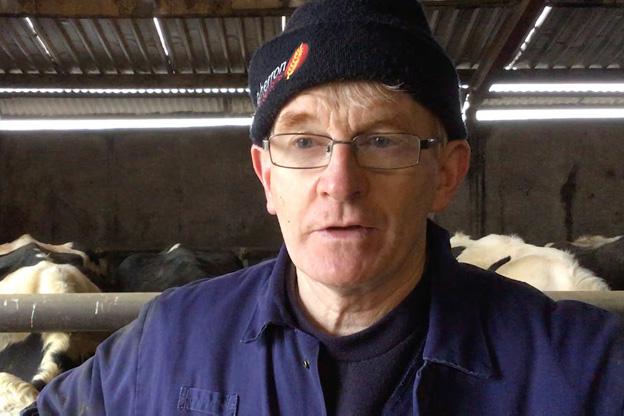
David McCoy.
Drumins, Scotstown, Co Monaghan
Martin Corrigan farms about two miles from the border at Drumins, Scotstown, Co Monaghan.
He buys most of his meal and farm supplies for his dairy herd across the border in Northern Ireland so he crosses over and back on a regular basis.
“I think the British will pull out at the last hurdle,” he maintains.
“They will have no other choice but to go with a customs union.
“People around here don’t want to see the border closed. Our biggest worry is having no free movement. If that happened, it would slow everything up and there’s a big cross border trade around here.”
Scotstown, Co Monaghan
Pauric and Bernie Sherry have a dairy and egg farm in Scotstown, Co Monaghan, just south of the border.
Both believe that, as things stand, a no-deal Brexit and a hard border are on the horizon. “It will be back to border controls and checks. You’d wish it wouldn’t come to that but it’s looking inevitable,” says Pauric.
“No agreement and what it brings, we’re not sure,” says Bernie.
“Our eggs are all sold in the south. Broken eggs go north, but that’s only a very small part of the business. There will be bigger implications for the dairy side – we just don’t know what’s coming. We need to know what the implications will be,” says Pauric.
“We are three miles from the border and, like many of the farmers around here, we do a lot of trading in Rosslea, which is over the border in Fermanagh. Are we going to be checked every time we cross the border?”
Both recall vividly the border checks of the past.
Bernie comes from Emyvale, close to Derrycrow. “I remember being stopped and having the boot checked,” she says. “My first cousin Aidan McAnespie was shot on the border at Aughnacloy. God forbid we’d ever go back to that. It just doesn’t make sense.”
Bessbrook, Co Armagh
“There’s a lot of fear over a hard border but I don’t think it will become a reality. I don’t think it would benefit anyone north or south,” says Darren McCormick from Bessbrook.
“Hopefully there will be a smooth transition post-Brexit. I think men are quietly confident that things will be sorted out and that we will move on.”
He is confident the cross-border movement of maize and slurry will continue.
We have moved on a long way since 20 to 30 years ago, and no one wants to see us go back to that era
“There are a lot of intensive dairy units up here and there’s a lot of slurry coming from those units. If there’s a need for that slurry in the south, and all the proper procedures are followed, I don’t see why there would be an issue,” he says.
Likewise, he cannot see customs posts becoming a reality.
“We have moved on a long way since 20 to 30 years ago, and no one wants to see us go back to that era,” says Darren. “I can’t see any problems regarding retail or trade or investment for that matter.”
However, he does worry about a potential influx of cheap imports from other parts of the world. “Everyone produces to a very high standard here and I would like to see that maintained for any goods that are imported,” he says.
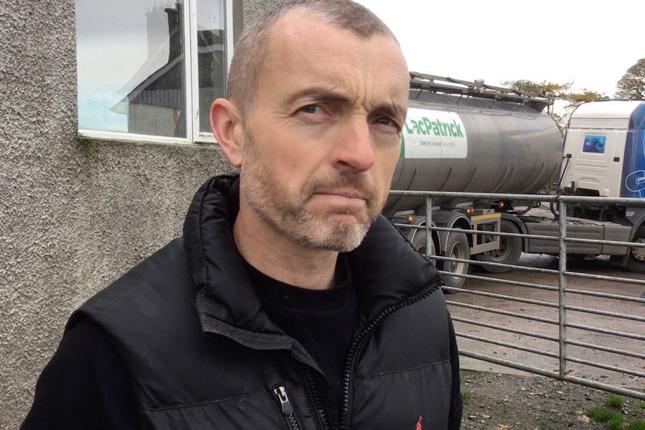
Darren McCormick.
Bessbrook, Co Armagh
Ivor McElroy says he has no idea how Brexit will affect farmers.
“The people at the helm don’t know. How would I know?” he asks.
“There probably will be difficulties as long as there is a border. It will lead to more paperwork, probably finance difficulties, I don’t know.”
He is worried about his basic payment and potential competition from other countries. “We can’t do without it [basic payment] but no one has said it’s the housewife that’s being subsidised, not us at all,” he says. “I would be worried about cheap food coming in.”
Dairy farmer, Bessbrook, Co Armagh
David Livingston supplies milk to LacPatrick from his farm in Bessbrook, Co Armagh.
“I don’t think anyone knows what’s going to happen. Hopefully there will be a deal and no hard border, because we need to get our exports across to the south, we need to get the milk across and that also works vice-versa I’m sure,” he says.
His milk crosses the border to the Republic for processing. He is unsure what Brexit will mean for his produce.
“It’s hard to know. Lakeland, which is taking over LacPatrick, has creameries north and south and hopefully that will help to limit any consequences,” he says.
The future for his farm payments under the CAP is also uncertain.
“My payment is guaranteed to 2022. It’s a different ball game after that,” says Livingston. “The British government is talking about linking it to environmental measures so I’m not sure what will happen. Hopefully, we will still get a payment and that there’s not too much of a drop.”
He is concerned about the impact a hard border could have on sectors other than dairy too.
“We don’t want a hard border, but equally we don’t want a border down the Irish Sea either. A lot of our beef goes to the rest of the UK and we need to get our exports over there.”
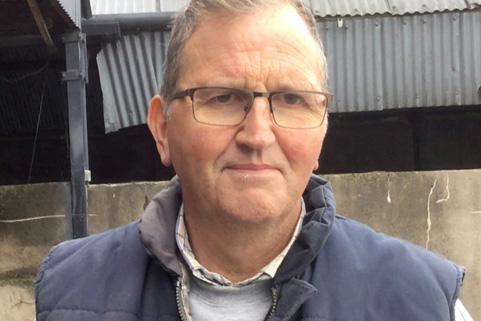
David Livingston.
Bessbrook, Co Armagh
Paul King from Bessbrook believes the Brexit border challenge will be dealt with. “There’s a lot of scaremongering going on,” he says. “Will your milk be able to cross over or will it not? I don’t see an issue. There’s too much at stake and they have to sort it out. Milk will have to go back and forth seamlessly, I think. I haven’t heard any farmer say anything different.”

Paul King.
‘We’re doing four loads a day across the border’
Brian Patterson has been collecting milk for LacPatrick (formerly Town of Monaghan) for 28 years.
When the Irish Farmers Journal joined him, he was collecting milk from farmers around Bessbrook, which is northwest of Newry in Co Armagh, for processing at LacPatrick’s Monaghan town plant.
Patterson’s route took him from Monaghan across the border to Keady and on to Bessbrook. He has clear memories of what the border checks were like.
“We lost a lot of time, lost an hour every load,” he recalls. “But we were only doing one load a day back then. Now we are doing four loads a day and you can’t afford to lose that much
time.
“You could be through Armagh in 20 minutes but Newry and Dundalk could put an extra two hours on a load. You had to get a special licence for Sunday mornings and be at the customs at an appointed time. If you didn’t make it, the customs guys were gone and you couldn’t get across.
“There is a lot more traffic now, a lot more trucks and drivers have to watch the tachograph,” he points out.
Farmers he talks to are unsure how Brexit will affect them.
“There’s lots of talk, but people don’t know what to say and they don’t know what will happen. They are worried enough about it,” says Patterson.
“Some farmers I’d be lifting from would be growing crops in the south and they’d be worried about getting crops down and slurry up. The slurry is a problem.
“There is plenty of land to grow maize around Dundalk that’s not available here and that would be a big miss for our larger farmers,” he adds.
Dairies should be compensated for Brexit processing tariffs – Strathroy
Dairies should be compensated for tariffs they incur for processing as a result of a no-deal Brexit, Strathroy director Cormac Cunningham has told the Irish Farmers Journal.
“On the island of Ireland, we have assurance from Government that whatever needs to be done will be done so that the flow of products will not be affected. I don’t think anything will be imposed overnight. The best thing to do is keep the border open,” he said.
The tariff you pay isn’t on the commodity, but on the process
Cunningham said the Omagh-based dairy is looking at an inward/outward situation when it comes to tariffs for collections and deliveries – where any product, be it milk, pigs or lettuce, goes North for processing but comes back down south afterwards again.
“The tariff you pay isn’t on the commodity, but on the process. We can show that we segregate milk already, so we won’t have to spend money on the processing, but we will have to pay for potential tariffs and paperwork.
“The tariff on processing could be quite small, it would be fairly insignificant. We have been lobbying Europe to absorb any costs, but the tariff itself on inward/outward processing can’t be set until the crash-out,” he said.
He said that dairies should either be compensated for the tariff by Europe, or Europe should waive such a tariff.
Southern dairy
Building a dairy in the Republic of Ireland as a result of a no-deal Brexit would be a last resort for Strathroy, Cunningham said.
“If we were to have a list of priorities [building a dairy in the south] is the last thing we would want to do.
“We’re always pushing for efficiencies and it would ruin efficiencies. It’s not something we want to do.”
LacPatrick sets out Brexit concerns
LacPatrick has been engaging with its customers and suppliers on Brexit concerns over the last 18 months. These engagements have stepped up in the past six to eight weeks, a LacPatrick spokesman told the Irish Farmers Journal.
The co-op is involved in ongoing merger discussions with Lakeland Dairies, which is subject to competition clearance.
However, regardless of those talks, there are two strands of its business that the co-op has to ensure, the spokesman said.
Delays
First, in the event of a hard border and subsequent delays, the co-op must make sure it can process all its milk in both the Republic of Ireland and Northern Ireland.
The second concerns products shipped across the world. Can LacPatrick service all its customers domestically and internationally?
Ask anyone what will happen when the UK leaves the EU and they will shrug their shoulders. Seven weeks out from 29 March and we are still in the dark.
Some farmers along the border fear they could also be faced with challenges they never expected to see again. Closed roads, long delays at border crossings and constant checks as they go about their everyday lives.
The Irish Farmers Journal spent a day travelling in a LacPatrick milk lorry to meet farmers in their own yards. Driver Brian Patterson took us from LacPatrick’s head office in Monaghan town, through Keady and on to Bessbrook in Co Armagh. Fellow driver Reggie Hall covered the horseshoe of Monaghan that is surrounded by Co Fermanagh, taking in Ballinode and Scotstown, northwest of Monaghan town.

There is a maze of roads that may need to be patrolled in the event of a hard border. Our drivers pointed out just some of the roads that were closed in the past.
Farmers on both sides of the border are concerned about potential road closures and border checks. They want the normality of the past 20 years maintained. They want to go about their business in an efficient manner.
As well as border disruption, farmers were worried about cheap imports, long-term support from the UK government, implications for leased land and how they would trade across the border.
Selloo, Scotstown, Co Monaghan
Dairy and egg farmer David McCoy from Selloo, Scotstown, Co Monaghan, is pessimistic about the chances of a deal being reached.
“I’ll be surprised if there is an agreement and it looks like they will crash out with no agreement,” he says.
The prospect of a hard border would have a significant impact on his farm.
“We have some land rented in Northern Ireland, just along the border, because it matches our own farm,” he says.
“It would certainly bring into question if we can continue to do what we are doing. We are only removing forage from the farm and there’s no livestock involved. But I don’t know if that will continue.
“In the past we have exported slurry from this home farm with a lot of paperwork to Northern Ireland.
But I don’t know what the position will be as far as that is concerned. I haven’t received any guidance from the Department of Agriculture yet.”
He remembers the restrictions imposed by the previous hard border but believes they will not return.
“I can’t see that, unless there is an outbreak of terrorism,” he says.
“However, if there are price differences between one jurisdiction and another, there will be people who will take advantage.”

David McCoy.
Drumins, Scotstown, Co Monaghan
Martin Corrigan farms about two miles from the border at Drumins, Scotstown, Co Monaghan.
He buys most of his meal and farm supplies for his dairy herd across the border in Northern Ireland so he crosses over and back on a regular basis.
“I think the British will pull out at the last hurdle,” he maintains.
“They will have no other choice but to go with a customs union.
“People around here don’t want to see the border closed. Our biggest worry is having no free movement. If that happened, it would slow everything up and there’s a big cross border trade around here.”
Scotstown, Co Monaghan
Pauric and Bernie Sherry have a dairy and egg farm in Scotstown, Co Monaghan, just south of the border.
Both believe that, as things stand, a no-deal Brexit and a hard border are on the horizon. “It will be back to border controls and checks. You’d wish it wouldn’t come to that but it’s looking inevitable,” says Pauric.
“No agreement and what it brings, we’re not sure,” says Bernie.
“Our eggs are all sold in the south. Broken eggs go north, but that’s only a very small part of the business. There will be bigger implications for the dairy side – we just don’t know what’s coming. We need to know what the implications will be,” says Pauric.
“We are three miles from the border and, like many of the farmers around here, we do a lot of trading in Rosslea, which is over the border in Fermanagh. Are we going to be checked every time we cross the border?”
Both recall vividly the border checks of the past.
Bernie comes from Emyvale, close to Derrycrow. “I remember being stopped and having the boot checked,” she says. “My first cousin Aidan McAnespie was shot on the border at Aughnacloy. God forbid we’d ever go back to that. It just doesn’t make sense.”
Bessbrook, Co Armagh
“There’s a lot of fear over a hard border but I don’t think it will become a reality. I don’t think it would benefit anyone north or south,” says Darren McCormick from Bessbrook.
“Hopefully there will be a smooth transition post-Brexit. I think men are quietly confident that things will be sorted out and that we will move on.”
He is confident the cross-border movement of maize and slurry will continue.
We have moved on a long way since 20 to 30 years ago, and no one wants to see us go back to that era
“There are a lot of intensive dairy units up here and there’s a lot of slurry coming from those units. If there’s a need for that slurry in the south, and all the proper procedures are followed, I don’t see why there would be an issue,” he says.
Likewise, he cannot see customs posts becoming a reality.
“We have moved on a long way since 20 to 30 years ago, and no one wants to see us go back to that era,” says Darren. “I can’t see any problems regarding retail or trade or investment for that matter.”
However, he does worry about a potential influx of cheap imports from other parts of the world. “Everyone produces to a very high standard here and I would like to see that maintained for any goods that are imported,” he says.

Darren McCormick.
Bessbrook, Co Armagh
Ivor McElroy says he has no idea how Brexit will affect farmers.
“The people at the helm don’t know. How would I know?” he asks.
“There probably will be difficulties as long as there is a border. It will lead to more paperwork, probably finance difficulties, I don’t know.”
He is worried about his basic payment and potential competition from other countries. “We can’t do without it [basic payment] but no one has said it’s the housewife that’s being subsidised, not us at all,” he says. “I would be worried about cheap food coming in.”
Dairy farmer, Bessbrook, Co Armagh
David Livingston supplies milk to LacPatrick from his farm in Bessbrook, Co Armagh.
“I don’t think anyone knows what’s going to happen. Hopefully there will be a deal and no hard border, because we need to get our exports across to the south, we need to get the milk across and that also works vice-versa I’m sure,” he says.
His milk crosses the border to the Republic for processing. He is unsure what Brexit will mean for his produce.
“It’s hard to know. Lakeland, which is taking over LacPatrick, has creameries north and south and hopefully that will help to limit any consequences,” he says.
The future for his farm payments under the CAP is also uncertain.
“My payment is guaranteed to 2022. It’s a different ball game after that,” says Livingston. “The British government is talking about linking it to environmental measures so I’m not sure what will happen. Hopefully, we will still get a payment and that there’s not too much of a drop.”
He is concerned about the impact a hard border could have on sectors other than dairy too.
“We don’t want a hard border, but equally we don’t want a border down the Irish Sea either. A lot of our beef goes to the rest of the UK and we need to get our exports over there.”

David Livingston.
Bessbrook, Co Armagh
Paul King from Bessbrook believes the Brexit border challenge will be dealt with. “There’s a lot of scaremongering going on,” he says. “Will your milk be able to cross over or will it not? I don’t see an issue. There’s too much at stake and they have to sort it out. Milk will have to go back and forth seamlessly, I think. I haven’t heard any farmer say anything different.”

Paul King.
‘We’re doing four loads a day across the border’
Brian Patterson has been collecting milk for LacPatrick (formerly Town of Monaghan) for 28 years.
When the Irish Farmers Journal joined him, he was collecting milk from farmers around Bessbrook, which is northwest of Newry in Co Armagh, for processing at LacPatrick’s Monaghan town plant.
Patterson’s route took him from Monaghan across the border to Keady and on to Bessbrook. He has clear memories of what the border checks were like.
“We lost a lot of time, lost an hour every load,” he recalls. “But we were only doing one load a day back then. Now we are doing four loads a day and you can’t afford to lose that much
time.
“You could be through Armagh in 20 minutes but Newry and Dundalk could put an extra two hours on a load. You had to get a special licence for Sunday mornings and be at the customs at an appointed time. If you didn’t make it, the customs guys were gone and you couldn’t get across.
“There is a lot more traffic now, a lot more trucks and drivers have to watch the tachograph,” he points out.
Farmers he talks to are unsure how Brexit will affect them.
“There’s lots of talk, but people don’t know what to say and they don’t know what will happen. They are worried enough about it,” says Patterson.
“Some farmers I’d be lifting from would be growing crops in the south and they’d be worried about getting crops down and slurry up. The slurry is a problem.
“There is plenty of land to grow maize around Dundalk that’s not available here and that would be a big miss for our larger farmers,” he adds.
Dairies should be compensated for Brexit processing tariffs – Strathroy
Dairies should be compensated for tariffs they incur for processing as a result of a no-deal Brexit, Strathroy director Cormac Cunningham has told the Irish Farmers Journal.
“On the island of Ireland, we have assurance from Government that whatever needs to be done will be done so that the flow of products will not be affected. I don’t think anything will be imposed overnight. The best thing to do is keep the border open,” he said.
The tariff you pay isn’t on the commodity, but on the process
Cunningham said the Omagh-based dairy is looking at an inward/outward situation when it comes to tariffs for collections and deliveries – where any product, be it milk, pigs or lettuce, goes North for processing but comes back down south afterwards again.
“The tariff you pay isn’t on the commodity, but on the process. We can show that we segregate milk already, so we won’t have to spend money on the processing, but we will have to pay for potential tariffs and paperwork.
“The tariff on processing could be quite small, it would be fairly insignificant. We have been lobbying Europe to absorb any costs, but the tariff itself on inward/outward processing can’t be set until the crash-out,” he said.
He said that dairies should either be compensated for the tariff by Europe, or Europe should waive such a tariff.
Southern dairy
Building a dairy in the Republic of Ireland as a result of a no-deal Brexit would be a last resort for Strathroy, Cunningham said.
“If we were to have a list of priorities [building a dairy in the south] is the last thing we would want to do.
“We’re always pushing for efficiencies and it would ruin efficiencies. It’s not something we want to do.”
LacPatrick sets out Brexit concerns
LacPatrick has been engaging with its customers and suppliers on Brexit concerns over the last 18 months. These engagements have stepped up in the past six to eight weeks, a LacPatrick spokesman told the Irish Farmers Journal.
The co-op is involved in ongoing merger discussions with Lakeland Dairies, which is subject to competition clearance.
However, regardless of those talks, there are two strands of its business that the co-op has to ensure, the spokesman said.
Delays
First, in the event of a hard border and subsequent delays, the co-op must make sure it can process all its milk in both the Republic of Ireland and Northern Ireland.
The second concerns products shipped across the world. Can LacPatrick service all its customers domestically and internationally?















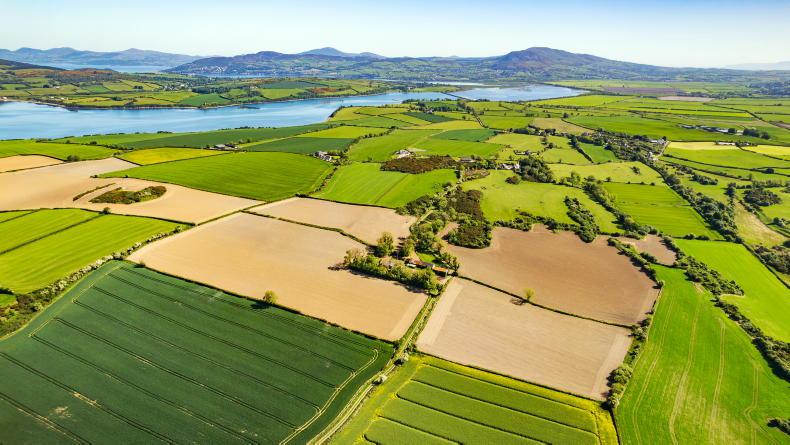

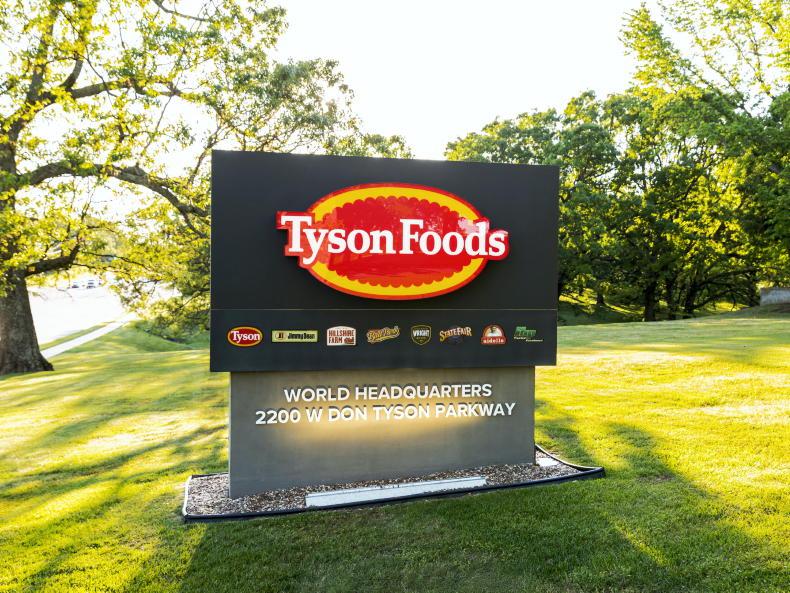


SHARING OPTIONS